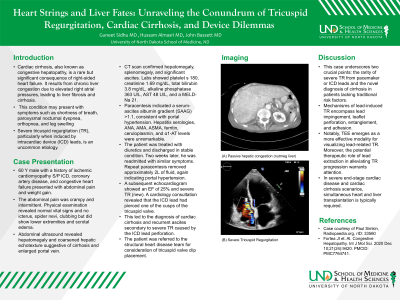Tuesday Poster Session
Category: Liver
P4824 - Heart Strings and Liver Fates: Unraveling the Conundrum of Tricuspid Regurgitation, Cardiac Cirrhosis, and Device Dilemmas
Tuesday, October 29, 2024
10:30 AM - 4:00 PM ET
Location: Exhibit Hall E

Has Audio

Guneet Sidhu, MD
University of North Dakota
Fargo, ND
Presenting Author(s)
Guneet Sidhu, MD1, Hussam Almasri, MD2, John Bassett, MD, FACG2
1University of North Dakota, Fargo, ND; 2Sanford Health, Fargo, ND
Introduction: Cardiac cirrhosis, also known as congestive hepatopathy, is a rare but significant consequence of right-sided heart failure. It results from chronic liver congestion due to elevated right atrial pressures, leading to liver fibrosis and cirrhosis. Severe tricuspid regurgitation (TR), particularly when induced by intracardiac device (ICD) leads, is an uncommon etiology.
Case Description/Methods: 60 Y male with a history of ischemic cardiomyopathy S/P ICD, coronary artery disease, and congestive heart failure presented with abdominal pain and weight gain. The abdominal pain was crampy and intermittent. Physical examination revealed normal vital signs and no icterus, spider nevi, clubbing but did show lower extremities and scrotal edema. Abdominal ultrasound revealed hepatomegaly and coarsened hepatic echotexture suggestive of cirrhosis and enlarged portal vein. CT scan confirmed hepatomegaly, splenomegaly, and significant ascites. Labs showed platelet s 180, creatinine 1.69 mg/dL, total bilirubin 3.8 mg/dL, alkaline phosphatase 363 U/L, AST 48 U/L, and a MELD-Na 21. Paracentesis indicated a serum-ascites albumin gradient (SAAG) >1.1, consistent with portal hypertension. Hepatitis serologies, ANA, AMA, ASMA, ferritin, ceruloplasmin, and α1-AT levels were unremarkable. The patient was treated with diuretics and discharged in stable condition. Two weeks later, he was readmitted with similar symptoms. Repeat paracentesis removed approximately 2L of fluid, again indicating portal hypertension. A subsequent echocardiogram showed an EF of 25% and severe TR (new). A cardiology consultation revealed that the ICD lead had pierced one of the cusps of the tricuspid valve. This led to the diagnosis of cardiac cirrhosis and recurrent ascites secondary to severe TR caused by the ICD lead perforation. The patient was referred to the structural heart disease team for consideration of tricuspid valve clip placement.
Discussion: Cardiac cirrhosis results from chronic liver congestion due to elevated right atrial pressures, often seen in right-sided heart failure, leading to liver fibrosis and cirrhosis. Severe TR, particularly device lead-associated TR, is an underrecognized cause of cardiac cirrhosis, with new or worsening TR occurring in 10% to 39% of ICD implantations. This case highlights rare complication where severe TR from an ICD lead caused significant liver disease and recurrent ascites. Treatment options are limited with initial management focusing on diuretics and interventions like tricuspid valve repair
Disclosures:
Guneet Sidhu, MD1, Hussam Almasri, MD2, John Bassett, MD, FACG2. P4824 - Heart Strings and Liver Fates: Unraveling the Conundrum of Tricuspid Regurgitation, Cardiac Cirrhosis, and Device Dilemmas, ACG 2024 Annual Scientific Meeting Abstracts. Philadelphia, PA: American College of Gastroenterology.
1University of North Dakota, Fargo, ND; 2Sanford Health, Fargo, ND
Introduction: Cardiac cirrhosis, also known as congestive hepatopathy, is a rare but significant consequence of right-sided heart failure. It results from chronic liver congestion due to elevated right atrial pressures, leading to liver fibrosis and cirrhosis. Severe tricuspid regurgitation (TR), particularly when induced by intracardiac device (ICD) leads, is an uncommon etiology.
Case Description/Methods: 60 Y male with a history of ischemic cardiomyopathy S/P ICD, coronary artery disease, and congestive heart failure presented with abdominal pain and weight gain. The abdominal pain was crampy and intermittent. Physical examination revealed normal vital signs and no icterus, spider nevi, clubbing but did show lower extremities and scrotal edema. Abdominal ultrasound revealed hepatomegaly and coarsened hepatic echotexture suggestive of cirrhosis and enlarged portal vein. CT scan confirmed hepatomegaly, splenomegaly, and significant ascites. Labs showed platelet s 180, creatinine 1.69 mg/dL, total bilirubin 3.8 mg/dL, alkaline phosphatase 363 U/L, AST 48 U/L, and a MELD-Na 21. Paracentesis indicated a serum-ascites albumin gradient (SAAG) >1.1, consistent with portal hypertension. Hepatitis serologies, ANA, AMA, ASMA, ferritin, ceruloplasmin, and α1-AT levels were unremarkable. The patient was treated with diuretics and discharged in stable condition. Two weeks later, he was readmitted with similar symptoms. Repeat paracentesis removed approximately 2L of fluid, again indicating portal hypertension. A subsequent echocardiogram showed an EF of 25% and severe TR (new). A cardiology consultation revealed that the ICD lead had pierced one of the cusps of the tricuspid valve. This led to the diagnosis of cardiac cirrhosis and recurrent ascites secondary to severe TR caused by the ICD lead perforation. The patient was referred to the structural heart disease team for consideration of tricuspid valve clip placement.
Discussion: Cardiac cirrhosis results from chronic liver congestion due to elevated right atrial pressures, often seen in right-sided heart failure, leading to liver fibrosis and cirrhosis. Severe TR, particularly device lead-associated TR, is an underrecognized cause of cardiac cirrhosis, with new or worsening TR occurring in 10% to 39% of ICD implantations. This case highlights rare complication where severe TR from an ICD lead caused significant liver disease and recurrent ascites. Treatment options are limited with initial management focusing on diuretics and interventions like tricuspid valve repair
Disclosures:
Guneet Sidhu indicated no relevant financial relationships.
Hussam Almasri indicated no relevant financial relationships.
John Bassett indicated no relevant financial relationships.
Guneet Sidhu, MD1, Hussam Almasri, MD2, John Bassett, MD, FACG2. P4824 - Heart Strings and Liver Fates: Unraveling the Conundrum of Tricuspid Regurgitation, Cardiac Cirrhosis, and Device Dilemmas, ACG 2024 Annual Scientific Meeting Abstracts. Philadelphia, PA: American College of Gastroenterology.
